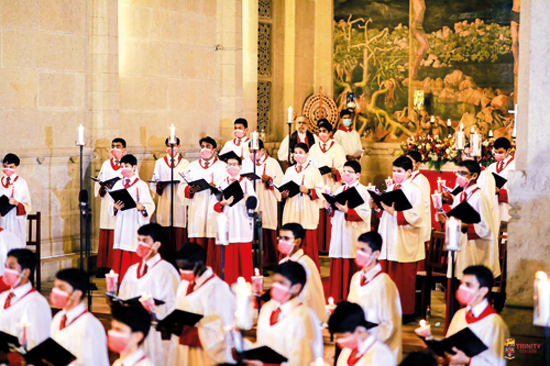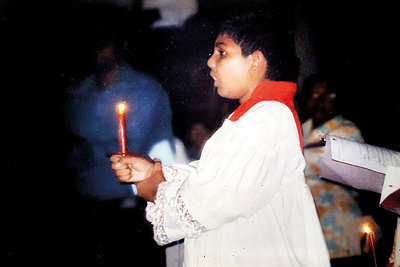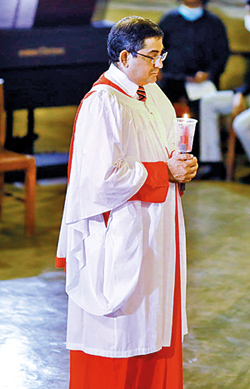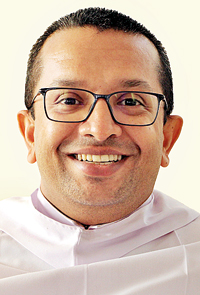When ‘angelic voices’ herald Christmas in Kandy

Carrying on a hallowed tradition: The Trinity College carol service 2021 in the college chapel. Pic by Chethaka Nisal Athukorala
In the hills of Kandy, the Christmas season seems inevitably to begin with the carols at Trinity College. The congregation returns expectantly, to hear the “angel voices” of the choir deliver a ritual reminder that a king was born and laid in a lowly stable.
Traditional preparations for the carols would start in September after the August holidays, when rehearsals begin, but the choristers have been preparing their hearts and minds all year. For the new and young ones especially, the induction into a brotherhood of sorts, governed by strict hierarchies and age-old traditions, is the beginning of a metamorphosis as they become part of the legacy that is the Trinity College choir.
The physical preparations build up the week before the service when the seniors stay overnight in the college to put the “choristers book” together.
“The choir room and the side chapel become a complete mess in the process,” reminisces Chrishan Fernando, choir leader from 2014, “but it was one of the things that really brought us together.”
Sheet music would be arranged according to the order of service and bound together with a mechanism that evolved over the years. The “book” which was “a bunch of papers tied together with a shoelace” in the ’80s metamorphosed into a tidy booklet held together with staples inside a cardboard file in the early 2000s. In its current form, it is a professionally printed and spiral bound folder of music interspersed with the relevant pages from the Order of Service. Choristers treasure these booklets for the scrawls and scribbles their peers inscribe on the blank pages at the back when the carol service ends. Many hold on to these books throughout their adult lives.

The carol by candlelight: The choir singing ‘Once in Royal David’s City’. Pix by Ashwin Dominic Jayalath
When the staple-punchers and shoe-lace tie-ers grew tired of the evening’s activities, they would walk over to the home of one of the boys (a few inevitably live on the college premises). “We would all get together and make dinner,” Chrishan says, conjuring images of short-clad teenagers scraping coconuts and chopping onions. This is another tradition observed around the carols – the (very) informal seniors’ dinner.
Parallel to the choristers books, another set of books related to the Festival of Nine Lessons and Carols have been lovingly collected over the years. Choirmaster Lasantha Tennekoon recalls a day in 2006 when soon after he agreed to fill the vacancy, his late predecessor Ronnie Thangaiah walked up to him with a gift of sorts. In his hands was a sheaf of papers loosely held together in a paper bag: the choirmaster’s personal collection of orders of services from the first. Lasantha will pass these on to his successor when the time comes.
While the seniors made the books, year after year, the staff members who live on the premises would walk up to the chapel on the eve of the service to decorate, put up a Christmas tree and put together the hallmark oil-lamp motif on the north lawn.

Former choir leader Chrishan Fernando as a young chorister
There are no rehearsals on the day but everyone (including the Principal) arrives early in semi-formal attire for afternoon tea in the Dining Hall. The familiar bitter and sweet of hot tea is meant to warm the choristers’ throats. The choirmaster reads messages from old boys and former choristers abroad who are not able to attend (though many regularly time their visits home to coincide with the carol service). This preamble provides a “slowing down” before the service proper, allowing the boys to place each particular service in the context of the scores that have taken place before.
After tea, the boys move to the cassock room where they dress. Then they all cram into the tiny space to hear the choir leader’s pep talk. The year has probably been a hard one for everyone. The juniors have had to conform to a strict hierarchy imposed on them by the seniors. The seniors themselves carry the tremendous burden of being responsible for the younger ones. There has probably been dissent and some disciplining. Some are facing the reality that this is the last carol service they will sing at, as Trinitians. The pep talk tugs at heartstrings and draws tears.
Hearts and minds set, the choristers then make their way to the driveway below the Principal’s Bungalow.
6.24 p.m.:There is a palpable aura of anticipation inside the chapel. The air is chilly, and there is likely a drizzle and wind. The chatter of all the young and the old, the Trinitians and the non-Trinitians, those who live in Kandy and who drove or flew over for the event, drops with the temperature.
6.25 p.m.: There is a soft clank as the lights in the sanctuary are switched off and those over the pews after them. The rainflies that gathered drawn to the heat of the bulbs now disperse, probably towards the oil lamps out on the lawn.

Choirmaster Lasantha Tennekoon
The pealing of bells. Silence.
Then floating over the air charged with the expectation of ears longing for music and hearts pining for redemption, comes the treble voice singing “Once in Royal David’s City”. The congregation exhales as the familiar rhythm of the service takes over. The rest is a glorious rejoicing that recalls the King who was born, and the King who is to come.
The first order of service (from 1935) indicates six lessons and eight carols. The format seems to have been gradually extended to include seven readings and a “Christmas Gospel” by the time of Major Gordon Burrows’ appointment as Choirmaster. The nine lessons and carols format of King’s College, Cambridge, was well in the making by the time Burrows’ choir was broadcast over the BBC World Service in December 1950. It was finally called as such in 1958.
To Principal Rev. Araliya Jayasundera, the most valuable tradition of the Trinity College Choir and the Festival of Nine Lessons and Carols is not so much in the music or the service as it is in the people who make it happen. “The choir is diverse, the majority are not Christians,” he points out: “music brings people together.”
Prof. Walter Perera, an old boy who was recently called to sing a solo at the carol service, joined the choir in 1966. He remembers attending the carol services in the 1950s during the time of choirmaster Burrows. “Even then, the choir was not confined to Christians – there were a few Buddhists, Muslims and Hindus as well,” he recalls. Even during the time of Major Burrows, the selection of music was “a good blend of traditional English carols and those from the rest of Europe and the US,” he says.
While the carol service marks the beginning of the Christmas season for Kandy, for the school itself, it is more the mark of the end of the school year. For the choristers, it is an even more conclusive event.

Trinity Principal Rev. Fr. Araliya Jayasundera
“The final hymn you sing at the carol service, ‘O Come All Ye Faithful’, is very emotional,” says Chrishan. For seniors leaving school that year, it is the end of an era. “The descant is so hard to sing. We are all sobbing and trying to pitch correctly through a runny nose,” he says, not quite laughing at the recollection. “And once you walk out, you’re out. You have done your part. You have run the race and fulfilled your calling there.”
After the service, when the congregation has dispersed, the choir changes back into formal attire and walks back up the driveway to the Choristers’ Dinner hosted by the Principal at his official residence. They sing some more and then stuff themselves with as much of the scrumptious meal as possible. More recently, it has also become tradition to formally announce the next year’s choir leader at this dinner.
“The evening would generally end on a note of sadness when those choristers who were leaving school had to make a farewell speech,” recalls Walter. “Usually, the “rioters” displayed the greatest emotion!”
After the formalities, there is mayhem. For a few glorious minutes or hours (depending on the agility of those involved) the strict hierarchical values that govern the establishment that is the Trinity College choir are overturned. Seniors “run for their lives” as the rest of the choir chases behind through the college grounds, bucketing them at strategically placed ambush points. From the principal’s bungalow, down past the chapel into the quadrangle, by the side of the main hall and parking lot all the way to the main gate.
For the younger boys who have for a year been subjected to sometimes excruciating levels of discipline in the name of tradition and respect, this is a euphoric release when balance is fleetingly restored. It allows the commitment of the choristers during their tenure to grow into a deep connection they maintain throughout their lives. It transforms those who meet for a mere practice into part of an almost sacred brotherhood that spans generations.
For the congregation that most likely encounters the choir only once a year, the carols have truly been a moment that harks back to the birth of Christ. An angel chorus of sorts, a reminder that the sparkle and glitter of what we now know as Christmas began in a humble stable bringing with it the hope of salvation for all mankind.
Searching for an ideal partner? Find your soul mate on Hitad.lk, Sri Lanka's favourite marriage proposals page. With Hitad.lk matrimonial advertisements you have access to thousands of ads from potential suitors who are looking for someone just like you.


